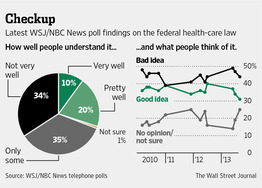Health Law Faces Skepticism
< < Go Back
Even Those Without Insurance Aren’t Keen on Coming Exchanges, Poll Finds.
New poll results show the depth of the Obama administration’s challenge on the eve of the rollout of the federal health law’s core provisions, as many Americans say they don’t understand the law and don’t think it will help them.
A Wall Street Journal/NBC News poll found that even those lacking health insurance, who are supposed to be the law’s biggest beneficiaries, generally believe it wouldn’t do them much good.
Overall, nearly 70% of poll respondents said they didn’t understand the health-care overhaul passed by Democrats in March 2010 or only understood a part of it. Only 31% said they thought the overhaul was a good idea, with 44% saying it was a bad idea and 25% saying they didn’t have an opinion or weren’t sure.
Uncertainty over the law has created a window for political groups on both sides to try to shape opinion in advance of midterm elections next year. Conservative organizations such as Americans for Prosperity have begun television advertisements criticizing the law, while Organizing for Action, the spinoff of President Barack Obama’s re-election effort, is running ads in its favor.
“From staff in community health centers, to public service announcements and outreach efforts, the six months from October to March will be key to raising awareness about the new market places and the benefits of the law for Americans,” said Tara McGuinness, a senior White House official.
Among the uninsured, 76% of respondents said they didn’t understand the law and how it would affect them. Only 32% of the uninsured thought they were “fairly” or “very” likely to use the exchanges.
Some 34% of respondents who don’t currently have insurance said they thought the law would have a negative effect on their family, and 52% said it wouldn’t change things for them.
The survey of 1,000 adults was carried out Sept. 5-8 and has a margin of error of plus or minus 3.1 percentage points.
More From The Wall Street Journal (subscription required):




